Explore Suwon - South Korea Travel, Asia
Suwon, the capital of Gyeonggi Province in South Korea, is a vibrant city located just 30 kilometers (19 miles) south of Seoul. This is the largest city in the province, serving as a key political, economic, and cultural hub. One of Suwon’s most iconic landmarks is Hwaseong Fortress, a UNESCO World Heritage Site that showcases stunning late 18th-century Korean architecture and military ingenuity. Beyond its historical appeal, Suwon is famous for its galbi (marinated beef ribs), particularly wanggalbi, which draws food lovers from across the country. The city also hosts numerous cultural festivals and events throughout the year, offering visitors an immersive experience in Korean traditions, arts, and crafts. Surrounded by picturesque landscapes and well-maintained parks, Suwon is ideal for nature enthusiasts who enjoy outdoor activities like hiking. With modern amenities, including an efficient public transit system and a thriving sports scene,
Population Approximately 1.2 million (as of 2024).
Economy: Suwon is home to the headquarters of Samsung Electronics, South Korea's largest and most profitable company. Suwon's economy is characterized by its strong focus on technology, support for small businesses, and commitment to education and sustainability. These factors not only drive economic growth but also create a vibrant environment for visitors, making it an engaging place to explore. Travelers can appreciate the blend of modern industry and historical significance that defines Suwon's unique character.
Cultural Significance: Hwaseong Fortress, Suwon World Cup Stadium, Korean Folk Village, Mr. Toilet House, Suwon Hwaseong Museum, Manseok Park, Suwon First Church
South Korea
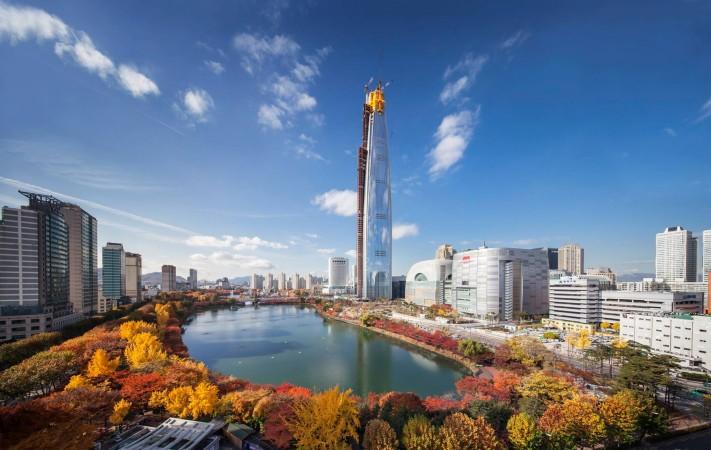
Overview of Suwon
History & Cultural Influence
Over the centuries, Suwon evolved under the influence of different Korean dynasties, including Goguryeo, A defining moment in Suwon’s history came in 1796 with the construction of Hwaseong Fortress, commissioned by King Jeongjo of the Joseon Dynasty. This UNESCO World Heritage Site stands as both a military marvel and a symbol of the king's filial devotion to his father, embodying the city’s deep-rooted Confucian values, particularly filial piety.
During the Japanese colonial period (1910–1945), Suwon played a role in Korea’s fight for independence, with several local activists contributing to the national resistance. This history of resilience continues to shape Suwon's cultural identity. Today, Suwon successfully merges its historical heritage with modernity. The city celebrates its past through events like the Suwon Hwaseong Cultural Festival, while institutions like the Samsung Innovation Museum highlight its role in Korea’s technological advancements.
Interaction with The Locals
When visiting Suwon, you can expect friendly and welcoming interactions with locals. The city with most residents being ethnic Koreans, though there is a small but growing foreign community. While Korean is the dominant language, younger generations may speak some English, though learning a few basic Korean phrases will go a long way in building rapport. Locals in Suwon are generally polite and respectful, and they appreciate visitors who show interest in the city’s rich cultural heritage, particularly its historical sites like Hwaseong Fortress. Visitors will likely find Suwon’s residents to be curious, helpful, and proud to share their city's blend of tradition and modernity.
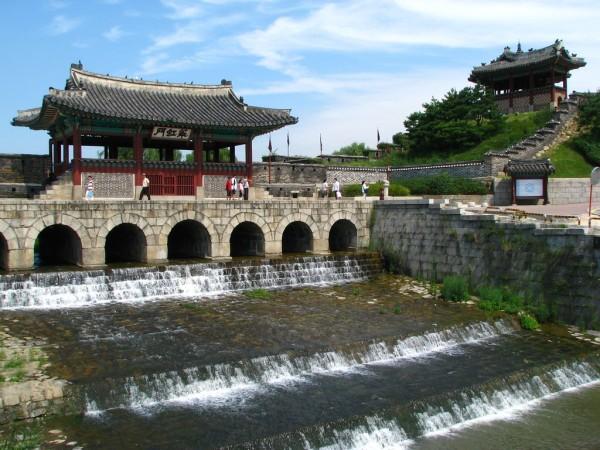
Hwahongmun Gate Suwon - © Brunch Story Korea
Top Attractions in Suwon
Hwaseong Fortress
A true symbol of Suwon, Hwaseong Fortress is a UNESCO World Heritage Site and one of the city's most cherished landmarks. Built in the late 18th century under King Jeongjo’s reign, this fortress is a masterpiece of military architecture, featuring robust walls, grand gates, and towering watchtowers. Visitors can immerse themselves in history by exploring not just the walls, but also Hwaseong Haenggung Palace, a temporary royal residence within the fortress, and Paldalmun Gate, one of its key entrances. The fortress provides a fascinating look at Korea’s past, offering panoramic views of the city and scenic paths for leisurely walks.
Gwanggyo Lake Park
For those seeking a peaceful escape, Gwanggyo Lake Park is a beautiful recreational haven in Suwon. Centered around a tranquil lake, this park offers scenic walking trails and lush greenery, perfect for a relaxing day outdoors. Whether you're picnicking by the water, jogging along the paths, or simply soaking in the natural beauty, Gwanggyo Lake Park is an idyllic spot for visitors of all ages. It's a wonderful place to unwind, especially as the sun sets over the lake, casting stunning reflections on the water.
Hwahongmun Gate (Buksumun)
One of the most striking features of Hwaseong Fortress, Hwahongmun Gate, also known as Buksumun, is an architectural gem. This gate, which spans the Suwoncheon Stream with its seven arches, was built not only for defense but also to regulate the water flow into the fortress. By day, the gate impresses with its intricate design and strategic purpose, while at night, it becomes a photographer’s dream as it’s illuminated, creating a magical reflection on the water. A walk around the gate in the evening offers a serene and beautiful experience, perfect for anyone looking to explore Suwon’s heritage in a calm, picturesque setting.
Banghwasuryujeong Pavilion (Dongbukgangnu)
Perched within Hwaseong Fortress, the Banghwasuryujeong Pavilion, also known as Dongbukgangnu, is a must-see for anyone visiting Suwon. The pavilion’s poetic name, which means “Pavilion of Water and Flowers in Full Bloom,” perfectly reflects its serene atmosphere. This historic structure offers sweeping views of the city and surrounding landscapes, and it’s particularly enchanting in the early morning when mist rises from the water below. Its beauty has made it a popular filming location for historical dramas, adding a touch of magic to its already captivating charm. If you're looking for a peaceful spot to reflect and take in the scenery, this pavilion won’t disappoint.
Korean Folk Village
Step back in time at the Korean Folk Village, a stunning recreation of life during the Joseon dynasty. Spanning 245 acres, this immersive cultural park is filled with thatched-roof houses, traditional workshops, and lively cultural performances. Visitors can witness artisans at work, see reenactments of historical rituals, and even try their hand at traditional crafts. The village beautifully captures Korea’s rich heritage and is an excellent destination for families, history buffs, and anyone eager to experience Korea’s past firsthand. With lush landscapes and authentic architecture, it’s easy to forget you're in the 21st century!
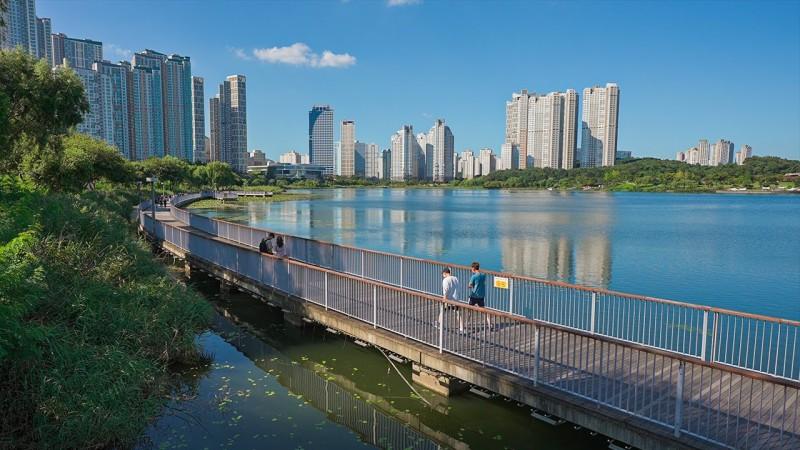
Gwanggyo Lake Park - © American STEM Edu
Must-Try Dishes in Suwon
- Suwon Galbi: This mouth-watering dish features marinated beef short ribs grilled to perfection, making it a beloved staple of Korean barbecue. What makes Suwon’s galbi stand out is its rich marinade, a savory blend of soy sauce, sugar, garlic, and onions, giving the meat an irresistible sweet and salty flavor.
- Korean Fried Chicken: For fried chicken fans, Suwon’s Fried Chicken Street is a paradise. This local gem is known for serving up some of the crispiest, most flavorful fried chicken in South Korea. Cooked whole in large cauldrons, the chicken develops a perfectly crispy exterior while staying juicy inside. Suwon’s fried chicken is often paired with a variety of mouth-watering sauces like garlic, soy sauce, or a sweet and spicy glaze.
- Bossam: Bossam has long been one among many great dishes that capture the heart of Korean cuisine. Thinly sliced boiled pork belly is the star, typically served with an array of delicious sides like fermented shrimp, kimchi, garlic and wrapped in lettuce leaves. Suwon takes bossam up a notch with its special Gul Bossam, which includes fresh oysters for a briny twist that complements the richness of the pork.
- Octopus Abalone Short Rib Soup: Octopus Abalone Short Rib Soup is a local favorite in Suwon, especially during the colder months. This rich and flavorful broth is packed with tender short ribs, fresh octopus, and abalone, creating a dish that’s both satisfying and nutritious. Known for its health benefits, this soup is believed to boost energy and strengthen the immune system, making it popular among locals.
- Tteokgalbi: A twist on traditional galbi, tteokgalbi features minced beef or pork rib meat, shaped into patties and grilled to perfection. The juicy patties are seasoned with a blend of spices that gives them a slightly smoky, savory flavor. In Suwon, this dish is often served with lettuce wraps and a spicy dipping sauce, making it a fun and flavorful meal to enjoy with friends or family.
- Bibimbap: Bibimbap consist of a base of warm rice, topped with a colorful array of vegetables, marinated meat, a fried egg, and a generous dollop of gochujang (red chili paste). The beauty of bibimbap lies in its simplicity and the harmony of flavors—when mixed together, it becomes a satisfying and well-balanced meal.
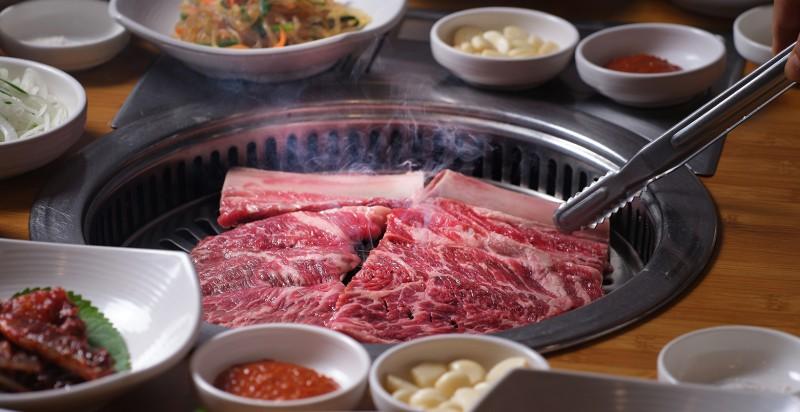
Suwon Galbi - © Korea.net
Weather in Suwon: Best Time to Visit
Suwon, South Korea, experiences a mild continental climate with warm, humid summers and cold, dry winters. Here are the key details about Suwon's weather and climate to help travelers plan their visit:
Temperatures
- Summers (June-August) are warm, with average high temperatures ranging from 25°C to 29°C (77°F to 84°F) and lows of 18°C to 22°C (64°F to 72°F).
- Winters (December-February) are cold, with average highs of 2°C to 5°C (36°F to 41°F) and lows of -5°C to -8°C (23°F to 18°F).
- Spring and fall are mild, with temperatures ranging from 5°C to 20°C (41°F to 68°F).
Best Time to Visit
- The best times to visit Suwon for warm-weather activities are from May to October, with July and August being the warmest and wettest months.
- Spring (April-May) and fall (September-October) offer mild temperatures and fewer crowds, making them ideal for sightseeing and outdoor activities.
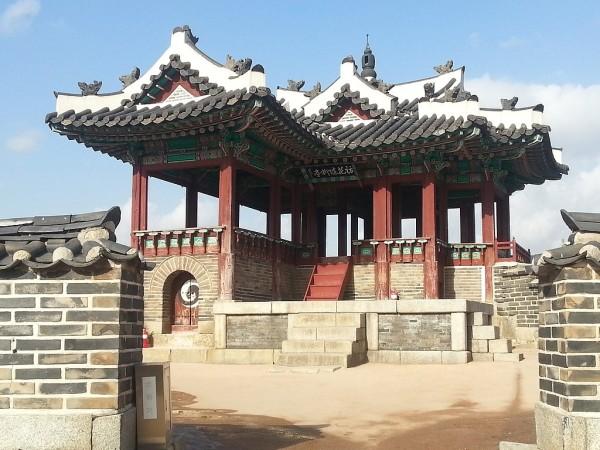
Suwon Wall - © Wikimedia
Festivals & Local Celebrations
Suwon hosts a variety of events and festivals throughout the year, showcasing its rich cultural heritage and vibrant community. Here are some notable events and festivals that travelers can look forward to during their visit:
Suwon Hwaseong Cultural Festival
- When: Annually in September
- This festival celebrates the history and culture of Suwon, particularly focusing on the Hwaseong Fortress. It features traditional performances, reenactments, and various cultural activities, including crafts and food stalls. Visitors can enjoy events such as the King Jeongjo's Royal Tomb event and nighttime light displays around the fortress.
Suwon Jazz Festival
- When: Typically held in the summer (exact dates may vary)
- This music festival attracts jazz enthusiasts from all over, featuring performances by local and international jazz artists. The festival creates a lively atmosphere with various stages set up around the city, allowing attendees to enjoy diverse musical styles in a vibrant setting.
Suwon Theater Festival
- When: Dates may vary, often in the fall
- Showcases theatrical performances from both local and international groups. It includes a range of genres, from traditional Korean plays to contemporary performances, providing a platform for artistic expression and cultural exchange.
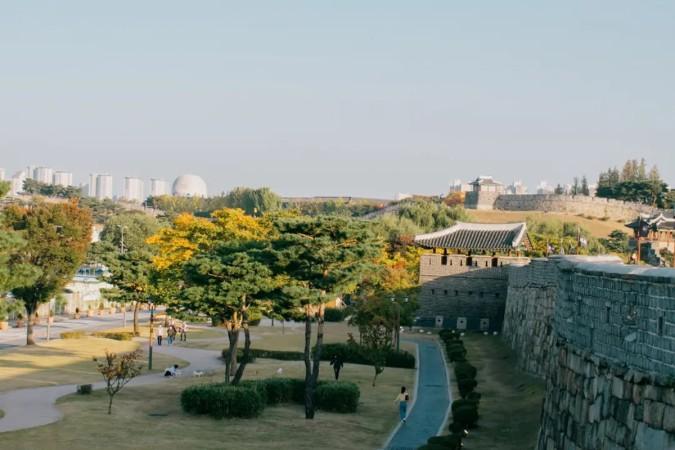
Hwaseong Haenggung - © Genk
Shopping in Suwon
Suwon's Traditional Markets
- Paldalmun Market: Located near Hwaseong Fortress, this market is known for its traditional Korean clothing, fabrics, and accessories. It features over 300 stores, with 40 specializing in hanbok (traditional Korean dress) and another 40 selling fabrics.
- Jidong Market: One of the largest traditional markets in Suwon, Jidong Market offers a wide variety of goods, including local produce, street food, and household items.
Shopping Malls and Districts
- Starfield Suwon: This modern shopping complex features luxury boutiques, cafes, restaurants, and entertainment options like a cinema and concert hall.
- AK PLAZA Suwon: A popular department store known for its wide selection of fashion, beauty, and home goods.
- Galleria Department Store Gwanggyo: Located in the Gwanggyo area, this upscale department store offers high-end shopping and dining experiences.
- Suwon Station Rodeo Street: A lively shopping district near Suwon Station, known for its trendy fashion stores and street food vendors.
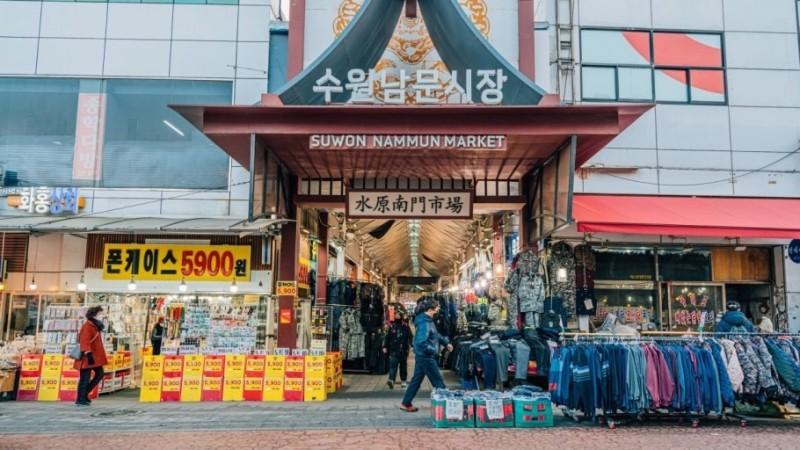
Suwon Nammun Market - © Plus Planner
Essential Travel Information
Getting Around Suwon
Public Transit
Suwon has a comprehensive public transportation system that includes:
- Subway: The city is served by Seoul Subway Line 1, with four stations in Suwon: Sungkyunkwan Univ., Hwaseo, Suwon, and Seryu. The subway is efficient and connects to other lines for broader access.
- Buses: An extensive bus network covers the city, including green buses for local routes and blue/red buses for longer distances to Seoul and neighboring cities. Buses are reliable and inexpensive.
Taxis
Taxis are widely available in Suwon, with two main types:
- Standard Taxis: Usually gray or white, these are the most common and affordable option.
- Deluxe (Black) Taxis: These are more spacious and comfortable but come at a higher fare. Prices may increase after midnight.
ATM and Banking Services
- ATMs: Suwon offers a wide network of ATMs, making it easy for both locals and visitors to access cash. Many major banks have ATMs around the city, providing services in English, which is especially convenient for international travelers. For example, the Kookmin Bank ATM at 686-6 Seryu-dong, Gwonseon-gu, Suwon-si, is a popular option that supports international cards and offers user-friendly services.
- Banking Facilities: Whether you're looking to exchange currency, open an account, or get financial advice, Suwon has several prominent local and international banks to assist. Some of the key banks include: Kookmin Bank, Shinhan Bank, Woori Bank, KEB Hana Bank. These banks have branches across the city, ensuring that you’re never far from professional banking services.
Where to Stay in Suwon
- Luxury Hotels: For those seeking comfort and convenience, Suwon offers several high-quality hotels with modern amenities, perfect for travelers looking to stay close to major attractions. These highly-rated hotels catering to both business and leisure travelers, featuring comfortable rooms and excellent dining options.
- Mid-range stays: If you're traveling on a budget, Suwon’s guesthouses and hostels provide affordable accommodation while giving you the chance to meet fellow travelers. These cozy options offer a more personal and friendly experience.
- Serviced Apartments: Ideal for longer stays, serviced apartments come equipped with kitchen facilities and offer more space, making them perfect for families or extended business trips.
- Homestays: For those seeking a unique stay, homestays in Suwon offer a range of choices, from modern apartments to traditional homes in local neighborhoods, allowing you to experience the city like a local.
Articles for you

Experience Aboard The RV Indochine II - A Mekong Cruise With Tweet World Travel
The RV Indochine II is a luxury river cruise ship, offering an unforgettable journey through many attractions along the Mekong River. Built in 2017, this upscale vessel combines colonial elegance with modern conveniences to create a comfortable yet stylish environment for its crew and passengers. The ship’s intimate size makes it ideal for those seeking a more personal cruising experience while exploring Vietnam and Cambodia rich culture, scenery, and heritage. Whether you're gazing at the landscape from your private balcony or enjoying authentic local cuisine, RV Indochine II promises an exotic adventure like no other.

Witness Stilt Fishing In Sri Lanka: An Eco-Tourism Experience
Sri Lanka, renowned for its stunning beaches and rich cultural heritage, harbors a unique tradition that has captivated travelers for centuries: stilt fishing. This ancient practice, passed down through generations of coastal communities, blends artistry with necessity, offering a glimpse into a way of life intimately connected to the island's coastal rhythms. Stilt fishing in Sri Lanka isn't merely a means to catch fish; it's a cultural emblem, embodying the resilience and ingenuity of Sri Lanka's fishing communities.

Make Your Trip Stress-Free With The Tweet Trip App
Embark on your next adventure with confidence by downloading the Tweet Trip App, available for both iOS and Android. This essential travel companion allows you to view your detailed itinerary, stay connected with your tour guide and fellow travelers, receive real-time updates, and provide feedback effortlessly. With features like in-app messaging, emergency assistance, and location sharing, the Tweet Trip App ensures you travel smarter, stay connected, and enjoy a seamless, worry-free journey. Get started today and make the most of your travel experience with Tweet World Travel.

Pedal Through Paradise: Unveiling Cambodia's Hidden Gems on Two Wheels
The gentle whir of bicycle wheels mingles with the distant chants of monks as you glide past emerald rice paddies stretching to the horizon. This is Cambodia - a sensory explosion waiting to be experienced on two wheels. At Tweet Tours, we believe there's no better way to immerse yourself in the Kingdom of Wonder than by bicycle.
Cambodia isn't just a destination; it's a living, breathing tapestry of ancient wonders, natural beauty, and vibrant culture. Our carefully crafted cycling tours take you beyond the typical tourist haunts, offering a unique perspective on this captivating country. Ready to clip in and discover the magic of Cambodia? Let's ride!

Trekking in the Himalayas: A Journey Through Nepal's Majestic Peaks
The Himalayas rise from the earth like colossal guardians, their snow-capped peaks piercing the sky in a display of nature's raw power and beauty. Nepal, nestled at the heart of this mountain range, serves as the gateway to some of the most breathtaking trekking experiences on the planet. Here, the air is crisp and thin, filled with the promise of adventure and the whispers of ancient tales.
With Tweet Tours, as you set foot on these hallowed trails, you're not just a traveler - you're a modern-day explorer, following in the footsteps of legendary mountaineers and age-old traders. Each step takes you further into a world where nature reigns supreme and human resilience is tested against the backdrop of some of the world's highest peaks.
From the moment your boots touch the ground in Kathmandu, you'll feel the pull of the mountains. The bustling streets of the capital, with their sensory overload of sights, sounds, and smells, soon give way to serene mountain paths where the only soundtrack is the crunch of gravel underfoot and the distant tinkling of yak bells.

Exploring Mui Ne's Wonders: Unique Attractions & Local Dishes
Nestled along the southeastern coast of Vietnam, Mui Ne emerges as a captivating gem, blending natural wonders with cultural richness. Renowned for its stunning landscapes and unique attractions, Mui Ne beckons travelers seeking both relaxation and adventure in equal measure. Mui Ne's renowned beach dunes, bustling fishing towns, and excellent local food await exploration at every turn.
The allure of Mui Ne lies not only in its pristine beaches and crystal-clear waters but also in its diverse range of activities catering to every traveler's whims. Whether you're drawn to thrilling water sports like kitesurfing and windsurfing on its dynamic shores or seeking tranquility amidst the picturesque Fairy Stream, Mui Ne promises an unforgettable journey filled with discovery.
